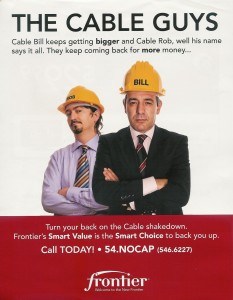Early indications of a more challenging second quarter of 2009 may be what’s behind the sudden speed increases and new promotions being run by providers, who are also counting on signing new customers, now that moving season is in full swing. A roundup of promotions and service adjustments customers may find enticing them:
AT&T
U-verse Internet Max customers received free upgrades last week in most areas, boosting broadband download speeds from 10Mbps to 12Mbps. AT&T previously announced a slowing of U-verse deployment for economic reasons. AT&T competes with cable operators offering video, voice, and broadband service.
Cablevision
Cablevision Systems continues to offer new customers taking at least a combined broadband and phone package a $200 American Express gift card through June 30. The company already announced major increases in premium speed levels, and promises no limits on consumption.
Comcast
Reduced pricing in highly competitive Washington, DC market for premium 50Mbps service to under $100, for customers signing up for at least two Comcast services (video, voice, and/or broadband)
Frontier
A substantial mailing offering discounts and giveaways was sent through postal mail to consumers in many Frontier service areas. Frontier is using a cable-critical mailer depicting their cable competitor as “Rob” and “Bill.”
Rogers (Canada)
Rogers, which earlier increased rates for subscribers, announced a “free speed increase” to its “Hi Speed Internet Express” package, from 7Mbps to 10Mbps, and “Internet Lite” from 1Mbps to 3Mbps. Rogers limits its customers typically to 60GB of consumption per month for standard levels of service. Much lower limits are placed on economy packages.
Time Warner Cable
Time Warner Cable is continuing to mail customer postcards and other mailings promoting its existing service packages, but this week also attempts to pick up customers trapped in Frontier term contracts by agreeing to cover early contract termination penalties, up to $200. Time Warner Cable is also hinting that cable customers will soon be able to use Tivo software for their Digital Video Recorder (DVR) boxes, which permit customers to record programming.
Verizon
Verizon announced substantial speed increases throughout their service area. The company also has engaged in a price war with Cablevision over gift cards. Verizon offered $150 gift cards to new customers signing up for a service bundle (although Cablevison beat their offer by $50). The company also began promotional giveaways to customers signing a contract agreement.
To date, AT&T continues tests limiting consumption to as low as 20GB per month in Beaumont, Texas and Reno, Nevada. Comcast has a straight limit of 250GB of consumption per month for residential customers nationwide. Frontier defines “acceptable use” at 5GB consumption per month, but does not enforce it at this time. Rogers limits consumption based on the level of speed selected by the customer. Most customers face a 60GB monthly limit. Time Warner Cable tested, but temporarily shelved, tiered pricing and consumption limits. Other providers not listed have no Internet Overcharging schemes in place.


 Subscribe
Subscribe
 The NoChokePoints Coalition has a point. They are a coalition of public interest groups and providers like British Telecom and Sprint-Nextel that are upset with monopolistic pricing for high speed broadband lines. Verizon and AT&T “control the broadband lines of almost every business in the United States” the coalition states, and “generates a profit margin of more than 100% for the controlling phone companies.”
The NoChokePoints Coalition has a point. They are a coalition of public interest groups and providers like British Telecom and Sprint-Nextel that are upset with monopolistic pricing for high speed broadband lines. Verizon and AT&T “control the broadband lines of almost every business in the United States” the coalition states, and “generates a profit margin of more than 100% for the controlling phone companies.”